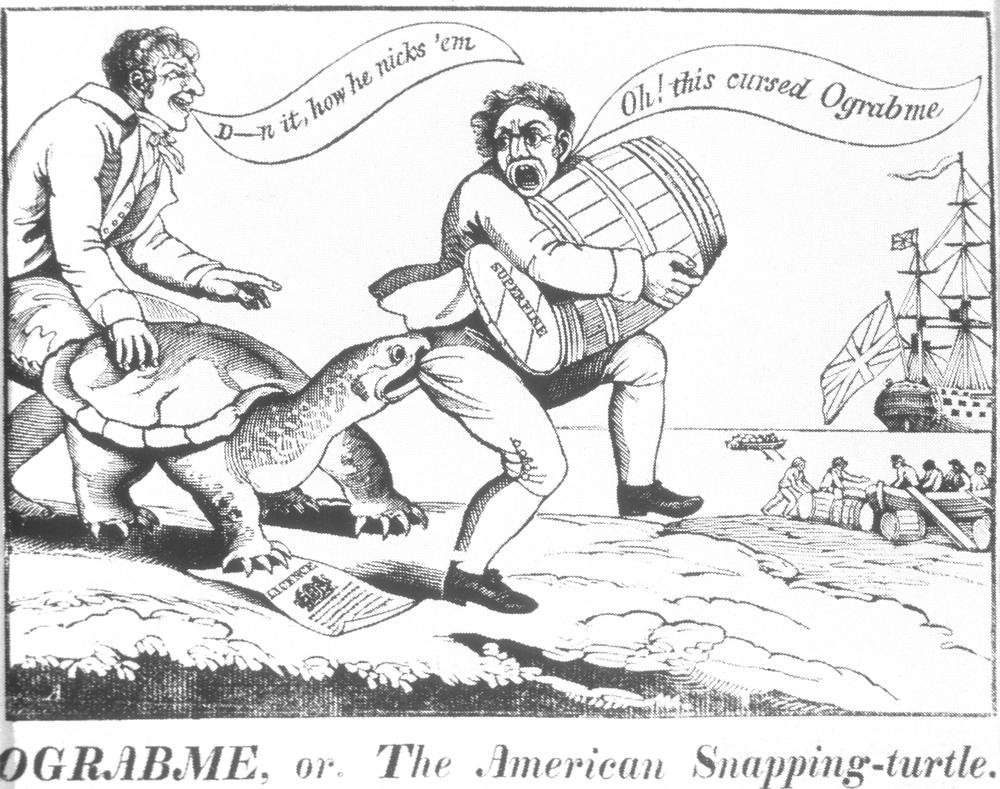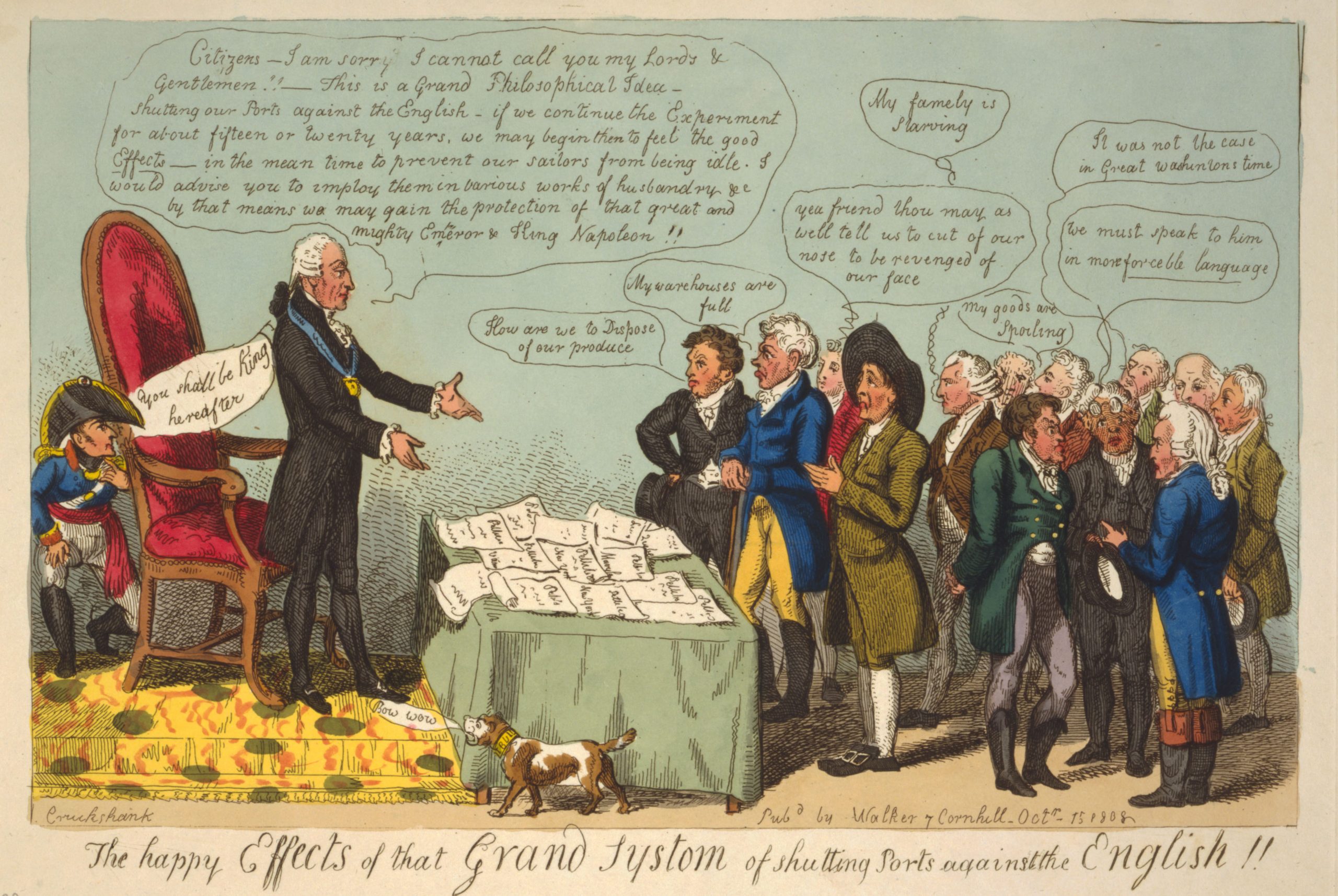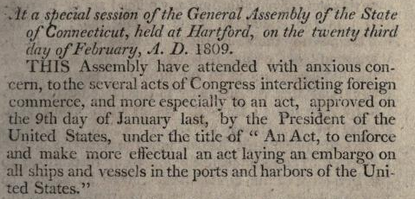Ed Dorgan
Har-Bur Middle School, Regional School District 10
TEACHER'S SNAPSHOT
Subjects:
Foreign Policy, Politics & Government, War of 1812
Course Topics/Big Ideas:
Globalization and Economic Interdependence, Role of Connecticut in U.S. History, Role of the United States in World Affairs
Town:
Statewide
Grade:
Grade 8
Lesson Plan Notes
The Embargo Act of 1807 was a general trade embargo on foreign nations enacted by the United States Congress. It represented an attempt by President Thomas Jefferson and the U.S. Congress to coerce Great Britain into stopping the impressment of American sailors and to respect American sovereignty and neutrality. To many, the embargo proved to be a complete failure. It did not improve the American diplomatic position, highlighted American weakness, and damaged the American economy. Both widespread evasion of the embargo and Britain’s opportunities to trade with other nations reduced its intended impact. The embargo undermined American unity by provoking bitter protests, particularly in New England commercial centers. Support for the declining Federalist Party, which intensely opposed Jefferson, temporarily rebounded and drove electoral gains in the Senate and House in 1808. Replacement legislation for the ineffective embargo was enacted on March 1, 1809, in the last days of Jefferson’s presidency. Tensions with Britain continued to grow and eventually led to the War of 1812.
ESSENTIAL QUESTION
SUPPORTING QUESTIONS
- Why was the Embargo Act of 1807 passed?
- What impact did the Embargo Act of 1807 have on the United States?
- How did Connecticut Governor Jonathan Trumbull Jr. respond to the 1807 Embargo Act?
- What lessons can be learned from Governor Trumbull’s actions against a U.S. law?
ACTIVITY
Note: Students should conduct this inquiry following a preliminary study of the United States Constitution and the “Supremacy Clause” (Article 6, 2nd paragraph).
1. Explore the compelling question, “When can a U.S. state refuse to follow a federal law?” by asking students to answer the following questions with a partner:
Which laws are superior: state or federal? (explain why)
What can a state government do to resist an “unjust” federal law?
Are there any current examples of states contesting or pushing back against federal laws and/or U.S. Supreme Court decisions regarding those laws?
2. Next, students will read a short article about the Embargo of 1807 and analyze an 1807 political cartoon (“Ograbme”) before answering questions about both sources.
3. Then students will examine a second political cartoon from 1808 (“The happy Effects of that Grand System of shutting Ports against the English!”) and complete the Library of Congress political cartoon analysis worksheet. You may find the Library of Congress Teacher Guide useful in guiding students through this analysis.
4. Working with a partner, students will read and annotate the “Address of the General Assembly of the State of Connecticut, 23rd February 1809” (pages 7 & 8) and complete the Library of Congress document analysis worksheet.
OPPORTUNITIES FOR ASSESSMENT
- Students will craft a written or oral argument to the state governor justifying the state’s right to “nullify” federal laws that they find to be unconstitutional.
- Students will research a current controversial government issue (i.e., gun control, reproductive rights, medical care assistance, police accountability, etc.) and make an argument for the supremacy of federal laws over state laws.
- Students will research a different embargo established at some point in history by the U.S. Congress and compare the outcomes with the Embargo of 1807.
RESOURCE TOOL KIT

Article about the Embargo Act of 1807 with accompanying worksheet, Ed Dorgan. 2022.

“Ograbme, or The American Snapping-turtle.” 1807.
Courtesy Presidential Campaigns: A Cartoon History, 1789-1976, Indiana University, Bloomington.

“The happy effects of that grand systom [sic] of shutting ports against the English!! / Cruikshank.” 1808. Library of Congress Prints and Photographs Division Washington, D.C.

“At a special session of the General Assembly of the State of Connecticut, held at Hartford, on the twenty third day of February, A.D. 1809 … An address of the General Assembly, to the people of Connecticut.” (pages 7 & 8) Internet Archive, courtesy Brock University.

Library of Congress Primary Source Analysis Tool

Library of Congress Teacher’s Guide: Analyzing Political Cartoons
ADDITIONAL RESOURCES
Places to GO
New London Maritime Society, New London
Connecticut’s Old State House, Hartford
Jonathan Trumbull, Jr. House Museum, Lebanon
Things To DO
Investigate Connecticut’s role in international trade during the Napoleonic Wars.
Investigate how other New England states responded to the Embargo of 1807.
Websites to VISIT
Articles to READ
“Connecticut and the Embargo Act of 1807” by Nancy Finlay. ConnecticutHistory.org.
“Connecticut Openly Defies President Jefferson’s Embargo.” February 23, 2019.
“Impressment of Sailors” by Robert McNamara. ThoughtCo. Updated on January 29, 2020.
“The Full Story of Thomas Jefferson’s Embargo Act of 1807” by Robert McNamara. ThoughtCo. Updated on August 05, 2019.



